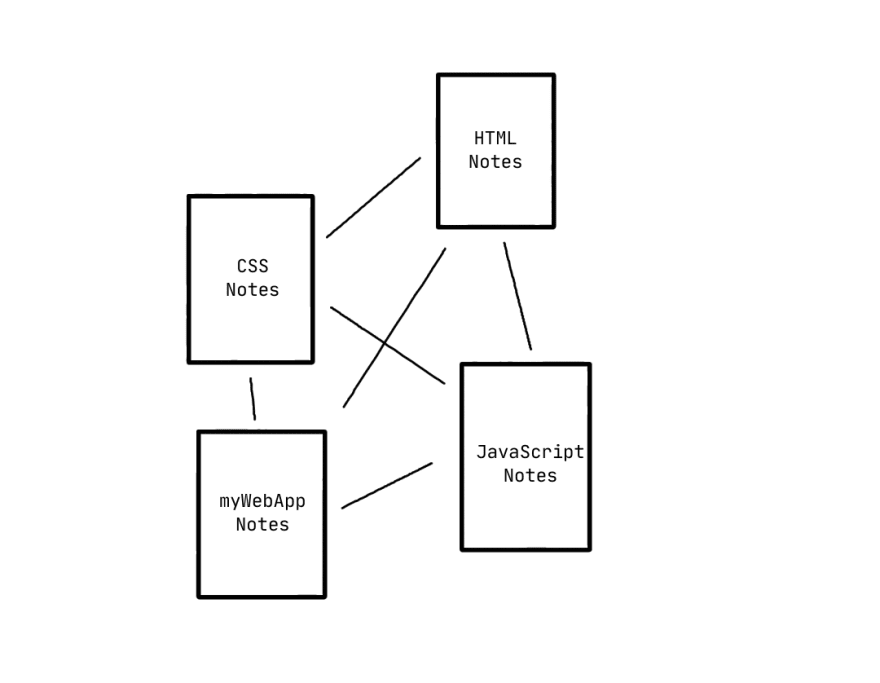Notes are a great way to write things down. But as you start writing more notes, the number obviously keeps increasing. This leads to having a large number of notes which are outdated or forgotten. This is mainly because these are separate notes and not connected with the other notes in anyway. So as humans, we forget about the connections as time passes.
Zettelkasten, a possible solution!
Imagine that you just started working on a web application project. You already have separate notes on what you know and have learnt about HTML, CSS and JavaScript. And now, a new note called myWebApp. In it, you wrote features the web application should have, your thoughts on the project etc. You know the ideas and lesson learnt from your notes on HTML, CSS and JavaScript are necessary for creating the web application. But since they are separate notes, you often forget the connections with myWebapp. Or how some information are connected.

An example illustration of how notes will look like when linked together.
This is where Zettelkasten (Slip box in English) comes into play. With the Zettelkasten method, the idea is to link all these notes together. And the output will be like a mind map of notes which are interconnected. It was invented by Niklas Luhmann who used this method to create 70+ books and 400+ research papers throughout his career!
This is an overly simplified explanation of what Zettelkasten is and can be. You can get a better understanding by read any or all the below linked blog posts. They helped me get started with Zettelkasten.
- Zettelkasten note-taking in 10 minutes by Tomas Vik
- Stop Taking Regular Notes; Use a Zettelkasten Instead by Eugene Yan
- Zettelkasten — How One German Scholar Was So Freakishly Productive by David B. Clear
All the small details thought to be insignificant or was a duplication from another note are currently noted. Since all you have to do is link the detail with a note it is related to. This helps me remember exactly why I noted it down.
So, another note taking app. Huh?
I know! But I don't change my notes application often. And Zettelkasten looks like the next logical step for a better information system for myself. If you are hesitant about transitioning right away, do it step by step. This helps you to see the tech in action and decide if it is really useful for you or not.
As for the app, I found Zettlr and Obsidian(Beta) as the best fit based on my tastes.
No, I haven't tried Roam Research because it is a web application.
Here is a comparison of features I was expecting from my next notes application. This is not a complete list of features these applications provide, just the features expected from a Zettelkasten note application I wanted to use. Both of them are nice, just check them out and choose the one you find fitting.
| Features | Zettlr | Obsidian (Beta) |
|---|---|---|
| Open Source | ✔️ | ✖️ |
| Free / Free plan | ✔️ | ✔️ |
| Markdown | ✔️ | ✔️ |
| Pomodoro | ✔️ | ✖️ |
| Graph View | ✖️ PR is open for this feature already | ✔️ |
| Save data locally | ✔️ | ✔️ |
| No vendor lock-in | ✔️ | ✔️ |
What is next?
I am currently in the transition period. Since this could be time consuming if done in bulk, I am taking things slow. But I am enjoying the process of taking notes more than before. Only time will tell whether I will see a connection I wouldn't have seen if it wasn't for my Zettelkasten!
Found this interesting or found some errors? DM me @unsungnovelty.
This post was first published at unsungnovelty.org under the title "Leveling up my notes game with Zettelkasten".



















